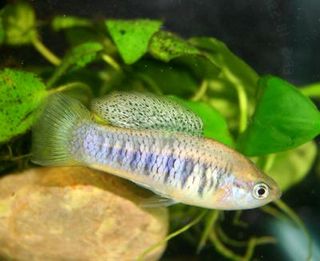In Fish Fights, The Little Guy May Have Best Odds

When fish fight over food, don't count the little guy out.
In hostile situations, a fish's personality — including how aggressive it acts — may matter more than size, according to new research.
The researchers from the University of Exeter in the United Kingdom and Texas A&M University in College Station studied how small fish managed relative to their larger peers when it came time for feeding. They found that small fish that exhibited aggressive behavior fared well in the feeding contests, regardless of their smaller stature.
"We wondered if we were witnessing a form of Napoleon, or small man, syndrome," Alastair Wilson, an evolutionary ecologist in the department of biosciences at the University of Exeter, said in a statement.
The findings, published in the April 2013 issue of the journal Behavioral Ecology and Sociobiology, indicate that the strength of a fish's personality may be crucial when food is scarce.
"Certainly our study indicates that small fish with an aggressive personality are capable of defeating their larger, more passive counterparts when it comes to fights over food," Wilson said. "The research suggests that personality can have far-reaching implications for life and survival."
Wilson and his colleagues paired up smaller and larger sheepshead swordtail fish (Xiphophorus birchmanni), and monitored their behavior when food was added to the tank. Fish that were more aggressive, regardless of size, were consistently the ones that won the food and subsequently gained weight, the scientists explained.
Sign up for the Live Science daily newsletter now
Get the world’s most fascinating discoveries delivered straight to your inbox.
The males were more inclined to attack the other fish to win the food, whereas females were less aggressive overall, and rarely attacked their opponent, the researchers found.
According to the researchers, none of the fish were distressed or sustained physical injuries during the experiments.
An animal's "personality" is characterized if it consistently displays an observed behavior, given certain conditions or environments, the researchers said. Previous studies have suggested that aspects of an animal's personality may be inherited. As such, the researchers are keen to examine whether aggressive behavior in feeding is tied to reproductive success, and ultimately how these factors influence the heritability of certain personality traits.
Follow Denise Chow on Twitter @denisechow. Follow LiveScience @livescience, Facebook & Google+. Original article on LiveScience.com.

Denise Chow was the assistant managing editor at Live Science before moving to NBC News as a science reporter, where she focuses on general science and climate change. Before joining the Live Science team in 2013, she spent two years as a staff writer for Space.com, writing about rocket launches and covering NASA's final three space shuttle missions. A Canadian transplant, Denise has a bachelor's degree from the University of Toronto, and a master's degree in journalism from New York University.
Most Popular



